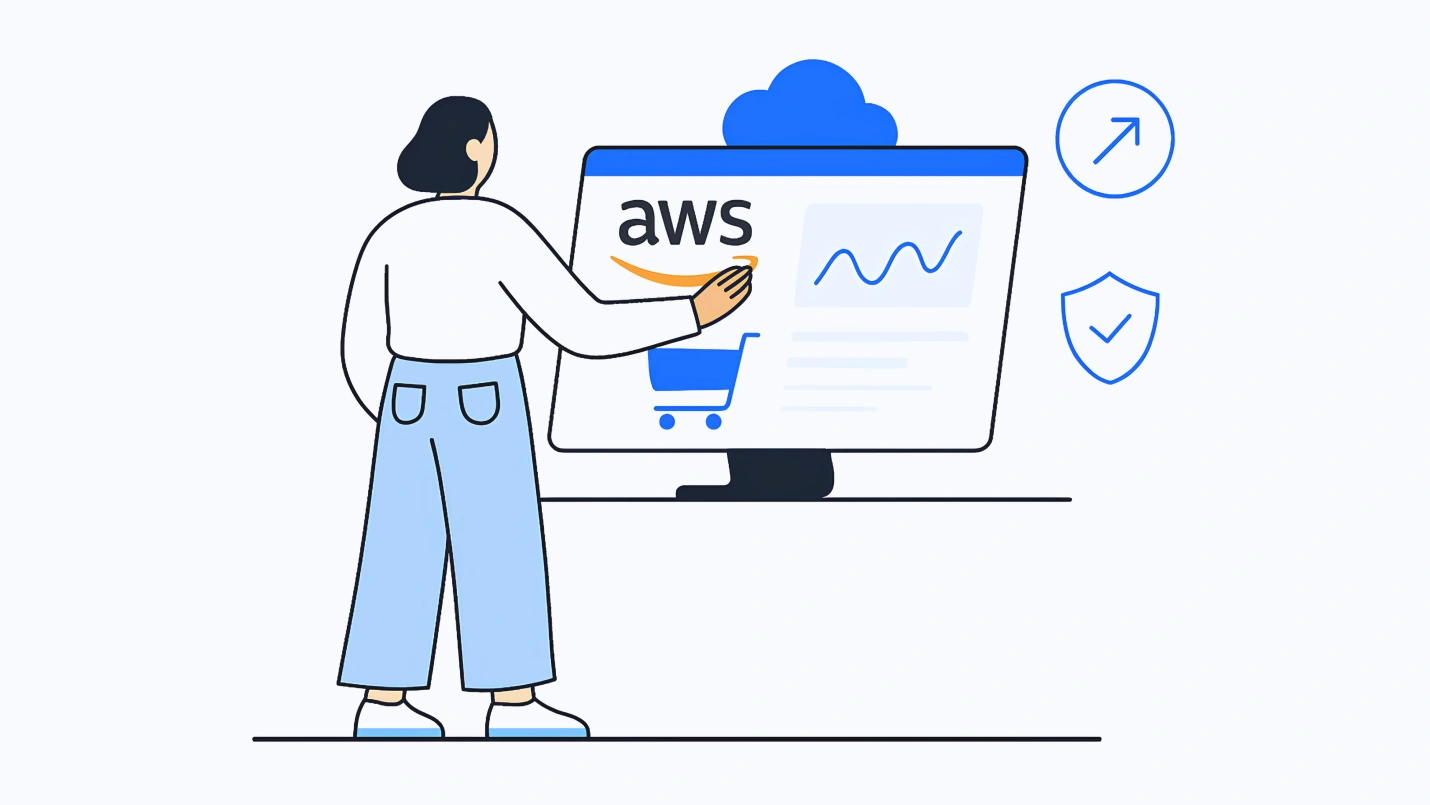AWS is the long-standing leader in cloud infrastructure and platform services. Discover the key AWS eCommerce services and how to build, scale, and secure your eCommerce business.
In the face of increasing competition and rapidly shifting consumer expectations and technology, delivering a superior eCommerce experience is no longer a ‘nice to have’ differentiator; it’s a matter of business survival. Choosing the right tools is essential to optimizing a digital commerce strategy that meets demand and is cost-efficient. Organizations worldwide have turned to AWS eCommerce solutions to become more agile and scalable.
The most notable Amazon AWS eCommerce services include Amazon Elastic Compute Cloud (Amazon EC2) as virtual servers to run eCommerce applications, Amazon Simple Storage Service (Amazon S3) for storing eCommerce images, Amazon Connect to set up seamless contact centers, and AWS Lambda to develop a serverless, microservices-based eCommerce app.
Fundamentals of AWS eCommerce Services
Cloud computing is the provisioning of on-demand resources through software as a service (SaaS), platform as a service (PaaS), or infrastructure as a service (IaaS). IaaS providers like AWS provide virtual data centers to help organizations build and manage operating systems, servers, and data storage and network infrastructure.
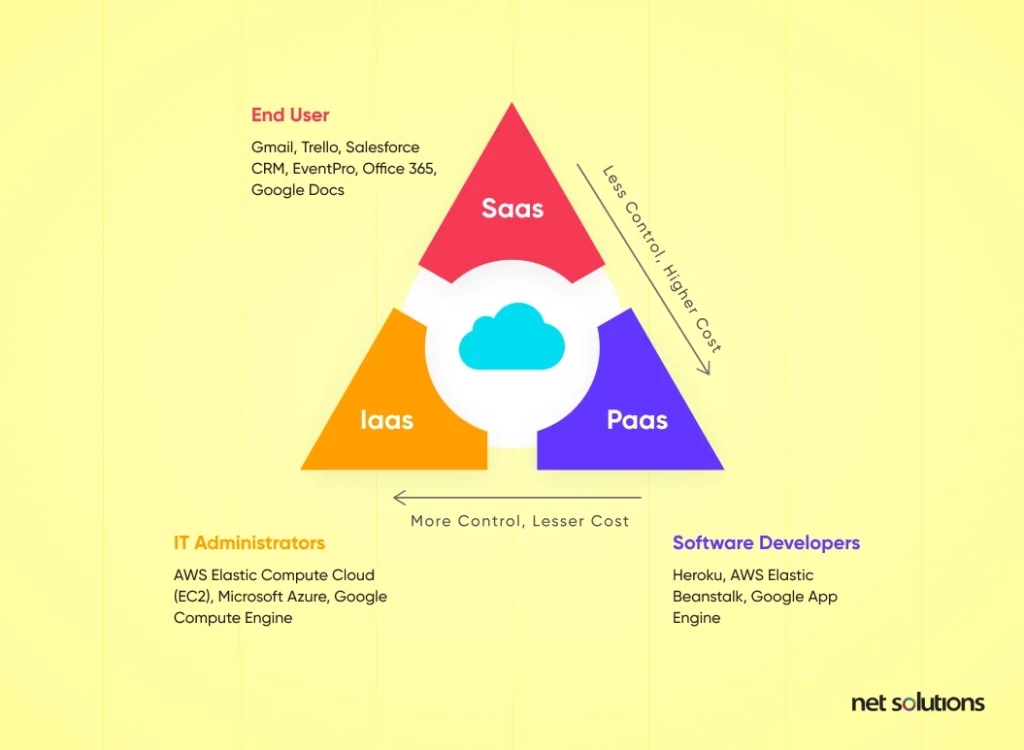
IaaS offers the lowest infrastructure costs, eliminating hardware costs and placing the onus on service providers to provide a stable infrastructure environment and to scale up or down as needed to allow a more focused approach to business growth. AWS competes in the IaaS space with Microsoft Azure, Google Cloud Engine, and Cisco Metacloud.
Overview of Amazon Web Services (AWS)
Amazon Web Services (AWS) is an Amazon subsidiary comprising on-demand cloud computing / Infrastructure as a Service (IaaS) resources. The AWS marketplace delivers over 200 products and services to consumers and organizations, including computing, storage, database, networking, analytics, application services, machine learning, mobile, and more.
Key benefits of using AWS for eCommerce applications
Amazon eCommerce architecture, in the form of AWS, is a secure, trusted, scalable solution for organizations, providing digital shopping experiences across multiple channels to help support today’s omnichannel retail strategies. eCommerce development leveraging AWS offers key benefits:
- Cloud services are scalable up or down on demand, allowing you to only pay for what you use.
- Backed by Amazon, new products and services are always being added, making it seamless and inexpensive to innovate with new ideas to deliver personalization, real-time services (chatbot, call center), or artificial intelligence.
- Support multiple channels for eCommerce, including web, mobile app, and social commerce, to deliver a consistent experience on each touchpoint.
- Lean on the abilities of AWS to support secure transactions.
- Leverage the latest technologies, including microservices and containers and serverless design.
- Support for retail needs, including fulfillment, last mile, and reverse logistics.
- Leverage Amazon’s expertise and tools to ensure security and compliance.
- Take advantage of advanced monitoring and performance tools to optimize your eCommerce app.
Overview of popular AWS services for eCommerce
AWS helps organizations support workloads such as app development, data processing, warehousing, and more, with over 200 products and services to customize the overall AWS ecommerce architecture needed.
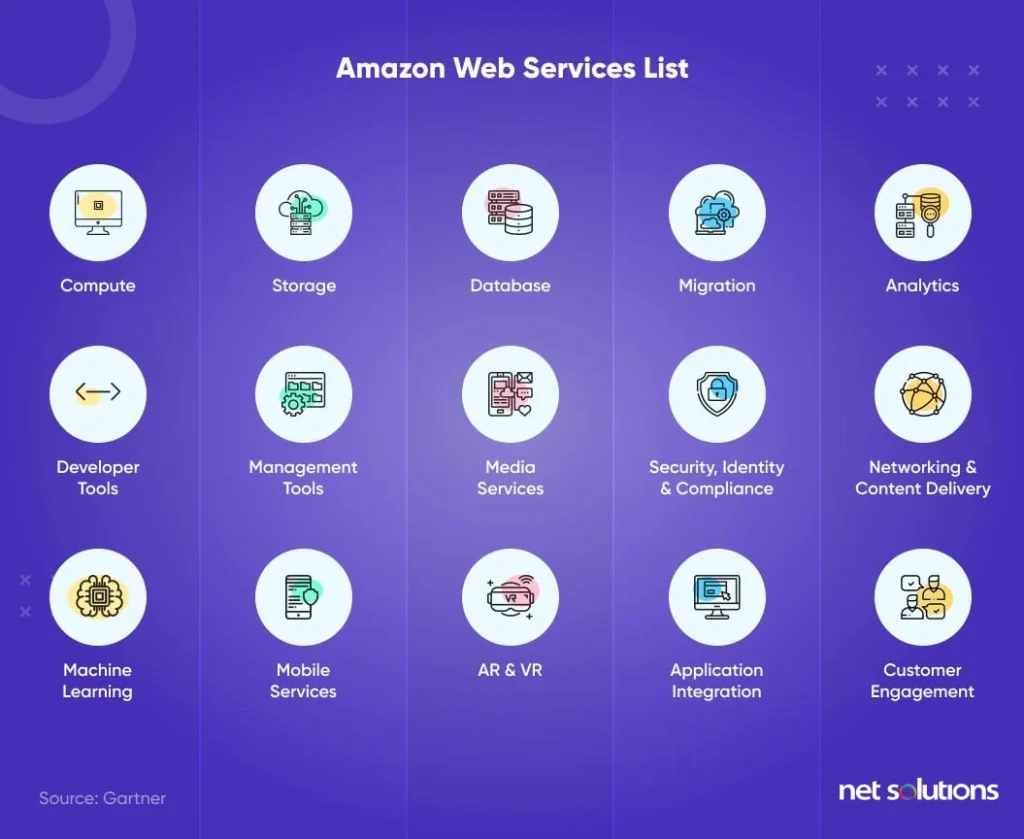
Popular AWS eCommerce services
Retailers are innovating with their eCommerce services with AWS. The following will detail all AWS categories and the AWS Best Practices for eCommerce, identifying the key products and services per category that every eCommerce brand should consider.
AWS compute services for eCommerce
The AWS compute platform is the base of IaaS – the virtual server and storage – needed to provision and manage your eCommerce application. In this category, we will cover basic machines such as Amazon EC2 as well as containers such as Amazon Elastic Container Service (ECS) and Amazon Elastic Kubernetes Service (EKS), serverless such as AWS Lambda, edge and hybrid services and flexible management options to help optimize resource usage, cost, traffic, and deployment.
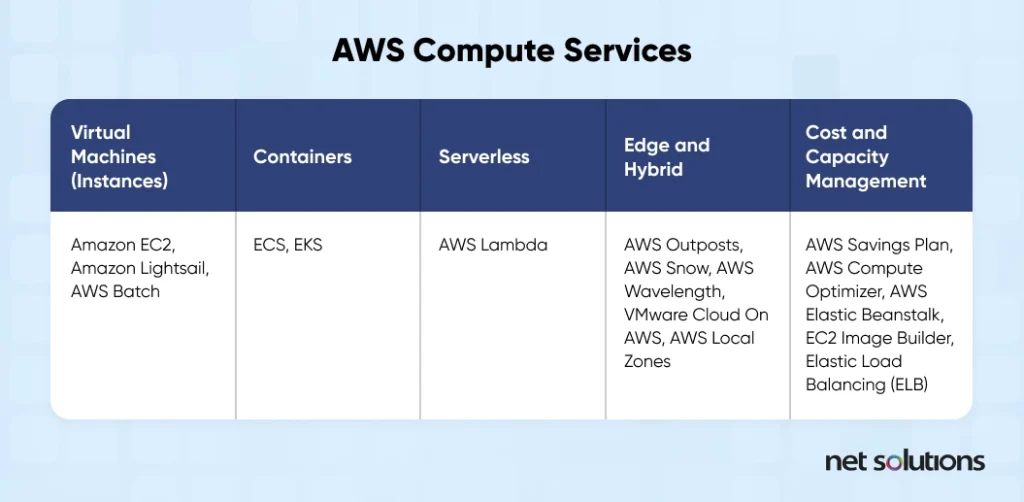
1. Amazon EC2 (Elastic Compute Cloud)
Amazon Elastic Cloud Compute (EC2) rents virtual computers to help deploy eCommerce applications and scale them as needed with secure, resizable compute capacity in the cloud.
Use cases for eCommerce applications.
Amazon EC2 provides on-demand infrastructure and capacity to run your eCommerce application.
2. AWS Lambda
AWS Lambda provides serverless computing for eCommerce, offloading additional tasks around setting up, managing, and maintaining resources.
eCommerce on AWS Lambda examples
AWS Lambda is ideally suited to dynamic content, including streamlining file processing tasks (e.g., adding new products), formatting product search results, submitting orders, or supporting inventory management. Most modern eCommerce architecture approaches leverage microservices, allowing the adoption of multiple services in the back end, such as payments (e.g., Stripe) alongside core interactive web and mobile shop services on AWS Lambda.
3. AWS Elastic Beanstalk
AWS Elastic Beanstalk helps deploy web applications (platform as a service), from capacity provisioning and load balancing to auto-scaling.
Deployment and management features
Without worrying about the underlying infrastructure, AWS Elastic Beanstalk makes it very rapid to deploy web apps or support legacy application modernization across various deployment options (command line, Visual Studio, Eclipse) with great monitoring and management tools.
AWS storage services for eCommerce
There is a broad range of AWS storage solutions, proven to reduce compute, networking, and storage costs by up to 66%.
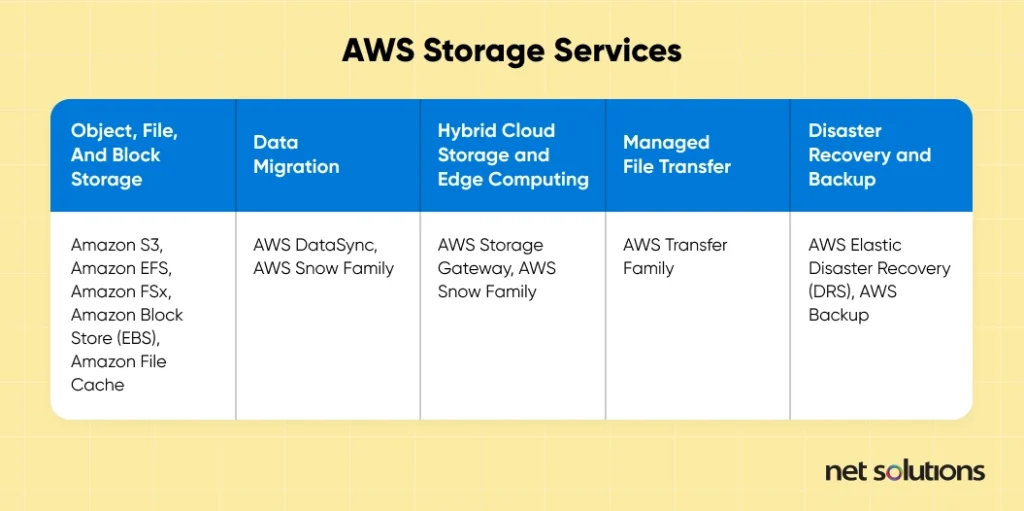
1. Amazon S3 (Simple Storage Service)
Amazon S3 is a scalable object storage solution for eCommerce with strong security and compliance protections and resilience to support maximum uptime of the eCommerce application.
Amazon S3 use cases and best practices.
Amazon S3 is ideal for storing unstructured data sets where data is mostly “read,” such as images or video files, and is the same base for Amazon.com’s eCommerce network. It is also ideal for backup.
2. Amazon EBS (Elastic Block Store)
Unlike S3, which is suited for object storage related to files and backups, Amazon EBS offers block storage for Amazon EC2 compute instances or highly available storage that scales.
Amazon EBS use cases and best practices.
Amazon EBS provides storage for EC2 instances to support dynamic storage of the product catalog or customer data.
AWS Database Services for eCommerce
Build scalable, distributed applications with a diverse set of database services from the most traditional/relational databases to support ERP, CRM, and eCommerce to advanced services for high-traffic eCommerce systems (key-value), user profiles (document) or recommendation engines (graph).
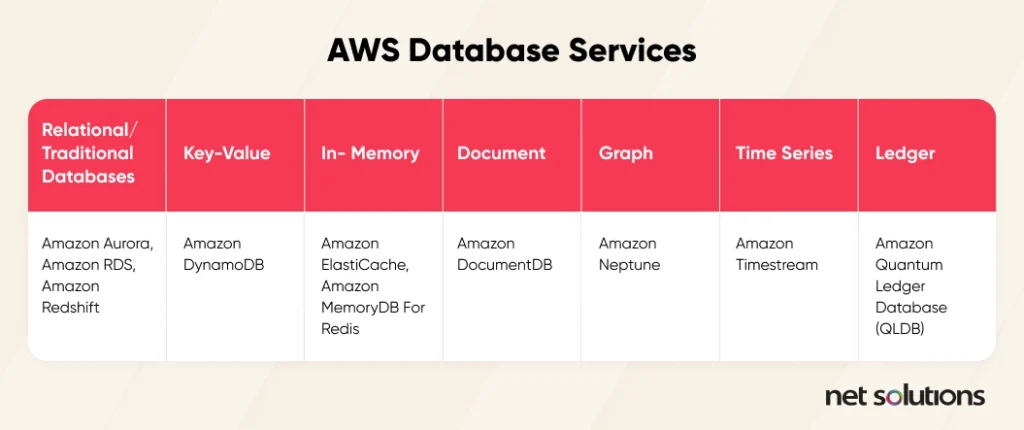
1. Amazon RDS (Relational Database Service)
Amazon RDS offers a managed relational database service for eCommerce, a more expensive but full-featured and flexible option for working with structured and relational data (SQL). Amazon RDS is the service’s name, not the database engine, and includes Amazon Aurora, MySQL, Oracle, PostgreSQL, SQL Server, and MariaDB.
Amazon RDS key featuremore traditional s and benefits
Amazon RDS is used for data storage needs in eCommerce (structured and unstructured data supported), ideally for CRM or for basic eCommerce needs where high availability is needed.
2. Amazon DynamoDB
Amazon DynamoDB is used with non-relational databases (NoSQL data) for high-scale eCommerce applications.
Amazon DynamoDB use cases and advantages.
Amazon DynamoDB is for NoSQL data and can support tables of any size and massive peaks, reducing latency and response time for reading and writing. This is essential to keeping shopping carts, mobile applications, or other high input/output needs around personalization or user preferences.
AWS networking services for eCommerce
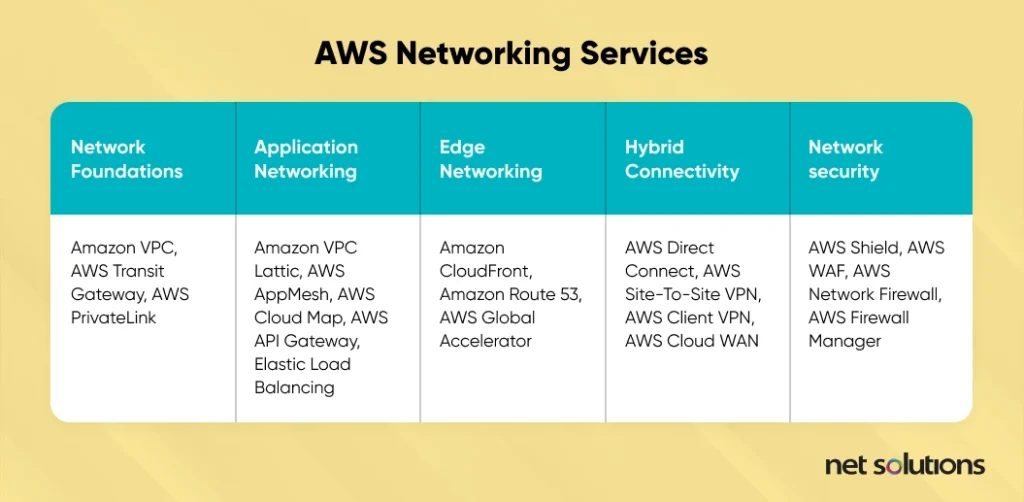
1. Amazon VPC (Virtual Private Cloud)
Amazon VPC provides secure networking for eCommerce applications, helping to run AWS resources in a virtual network where there’s control over what is public and what is private, a key element to security.
Use cases and best practices
Take control over resource use, connectivity, and security across Availability Zones or AWS Regions. Amazon VPC is your network foundation, connecting your corporate network with your application in the cloud and ensuring all communications are always secure.
2. Elastic Load Balancing
Load balancing is a process of distributing network traffic to make eCommerce applications more scalable and available.
Why use Elastic Load Balancing for eCommerce
Elastic Load Balancing is automation to performance, ensuring real-time identification of bottlenecks and automatic redistribution of traffic to meet demand without the need for complex configurations or API gateways.
3. AWS CloudFront
Content delivery network (CDN) for eCommerce to deliver data, applications, and APIs with a higher transfer speed and less latency.
Benefits and integration with eCommerce websites
Amazon CloudFront helps securely deliver eCommerce content globally with built-in compression and edge capabilities. For interactive eCommerce websites or feature videos, this helps ensure a quick start and consistency in play quality.
4. Amazon Route 53
Like CloudFront, Amazon Route 53 supports edge networking, routing users to applications with globally dispersed DNS and auto-scaling.
Use cases and best practices
Customize DNS routing and support a global eCommerce brand with routing policies that automate in the face of failure—trusted by mega-brands, including Netflix and McDonalds.
AWS management and governance services for eCommerce
A comprehensive set of tools to enable, provision, and operate environments with agility and control. Innovate faster.
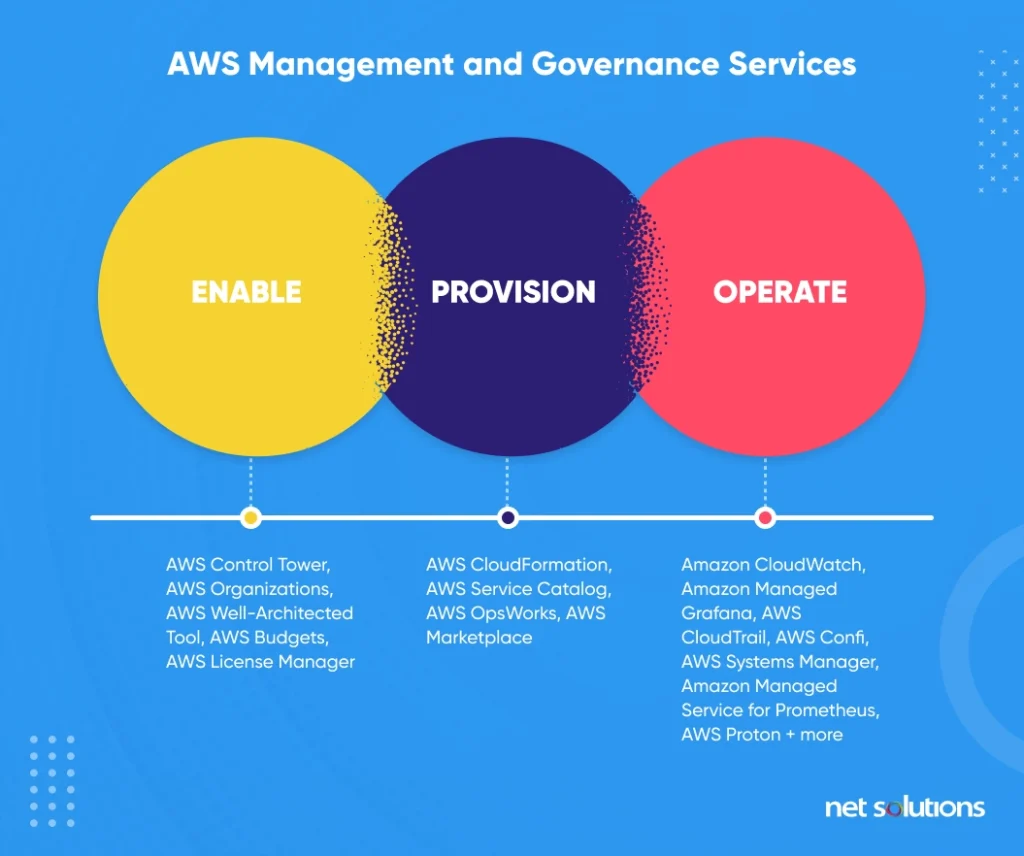
1. Amazon CloudWatch
Supports monitoring and logging for eCommerce applications, offering the visibility needed to understand system health and optimize resource use.
Key features and benefits
CloudWatch can create alarms if performance is sub-par, proactively optimize based on thresholds and machine learning, and bubble up data to help resolve issues faster. With customers today having a low threshold for site performance issues, this is essential.
2. AWS CloudTrail
AWS CloudTrail provides audit and compliance for eCommerce systems.
Use cases and importance
Generate audit reports with logs for external regulators (e.g., SOC, PCI, HIPAA) or internal analysis to identify and analyze unusual activity to protect systems from attack.
3. AWS CloudFormation
Speed up provisioning with Infrastructure as Code (IaC) for eCommerce deployments and provides a common language to manage multiple resources.
Benefits and use cases
For teams that support continuous integration and delivery (CI/CD), which is commonly needed to build agility into eCommerce apps.
AWS artificial intelligence (AI) and machine learning (ML) services for eCommerce
Take advantage of a rapidly growing set of artificial intelligence (AI) and machine learning (ML) services to help gain more insight from data, lower costs, and reinvent customer experiences.
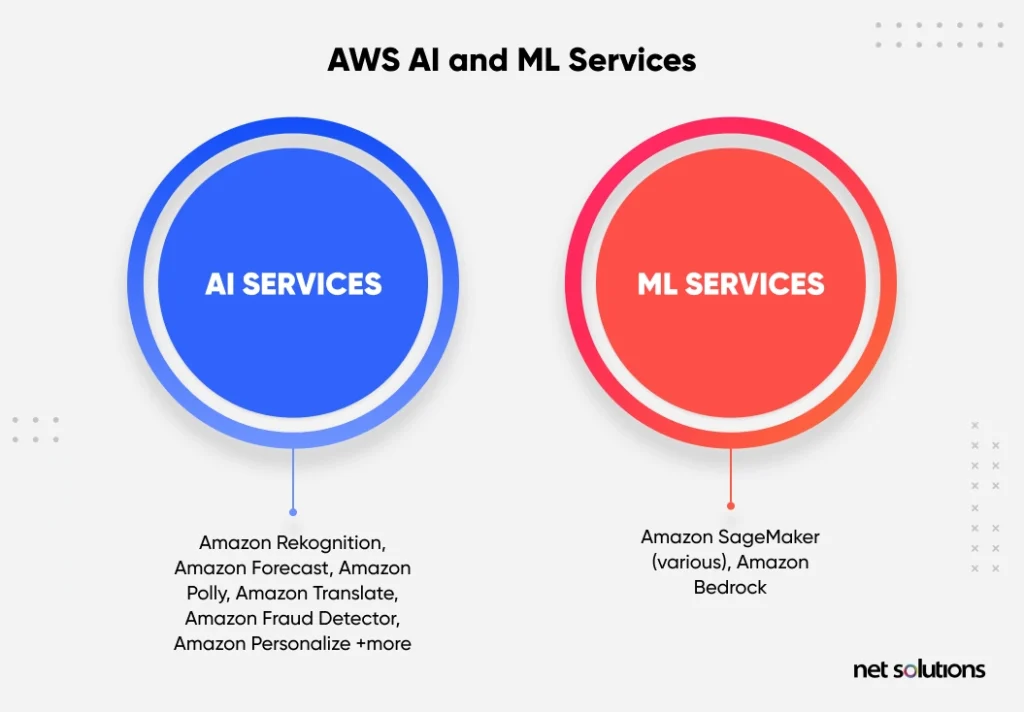
1. Amazon Rekognition
Supports image and video analysis for eCommerce, helping support authentication workflows or reducing unsafe or inappropriate additions to eCommerce sites via reviews.
Applications and benefits
Amazon Rekognition is key to detecting real users during identity verification or flagging inappropriate or inauthentic content in the batch upload or customer reviews.
2. Amazon Personalize
Personalization and recommendation engine for eCommerce to help elevate the customer experience.
Use cases and advantages
Use Amazon Personalize to meet the demands of today’s consumers with no ML expertise required. Support curated recommendations or segment your user database based on data culled from customer-supplied and user journey analysis to target your marketing better.
3. AWS Forecast
AWS Forecast uses machine learning for forecasting.
Use cases and advantages
Use Amazon Forecast to help accurately estimate inventory levels to create efficiencies of scale and reduce waste or to estimate times when temporary staff need to be scaled to support high-demand retail periods.
Key considerations when choosing AWS for eCommerce
AWS has maintained dominance in cloud computing due to its ability to offer a fast, secure, scalable, and cost-effective solution for eCommerce businesses of all sizes. However, one must consider:
- Migration- how will you transfer data? If there is an existing application, does it need to be modernized?
- Cost- balance the demands of your system against your budget and set limits as appropriate
- Security- while AWS can offer many security benefits, the onus is still on the provider to protect user data with appropriate protections
- Scaling- with scale come new needs, so ensure a centralized log collection to make use of as many analytics, ML, and AI tools as possible
Future trends and developments in eCommerce on AWS
eCommerce is constantly changing. Technology is constantly evolving. AWS is at the forefront of innovation, helping shape the future of digital commerce, including:
- Intelligent supply chain solutions around visibility and transportation
- New immersive commerce experiences
- Conversational AI comes to chatbots
- Build interactive video experiences
- Greater partner integrations with AWS, e.g., 3D product visualizations by Hexa
Why do we need AWS, and How Net Solutions can help
AES eCommerce success requires the perfect marriage between innovation, design, and data-backed decision-making. At Net Solutions, we optimize every aspect of your presence in the digital marketplace with eCommerce development services and AWS consulting services from certified AWS developers who provide world-class infrastructure design and execution for businesses of all sizes and scopes.
Frequently Asked Questions
Amazon does not have an eCommerce platform, but it does support one-click deployments of other eCommerce platforms such as Magneto.
Yes, like many other major eCommerce platforms, Shopify relies on AWS.
Yes, AWS is designed to make it easy to support both. See the benefits section above.
Yes, AWS is built to scale as needed. For businesses that deal with massive traffic spikes, consider using tools such as Firebase, AWS Elastic Load Balancing, AWS Lambda, or AWS CloudWatch.

